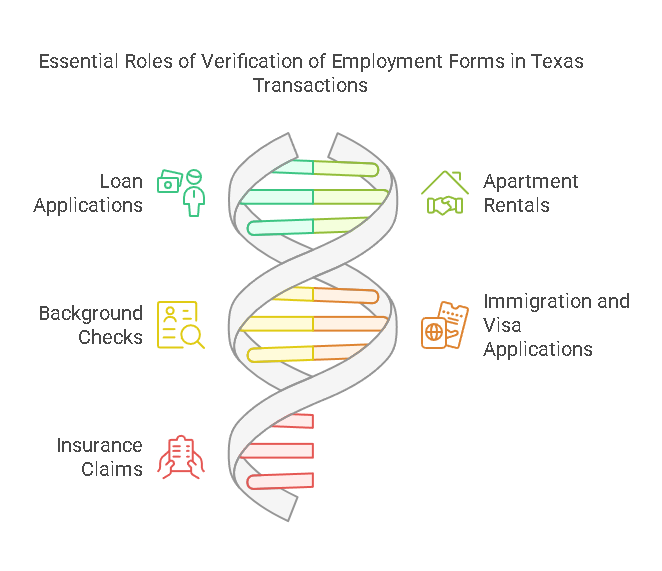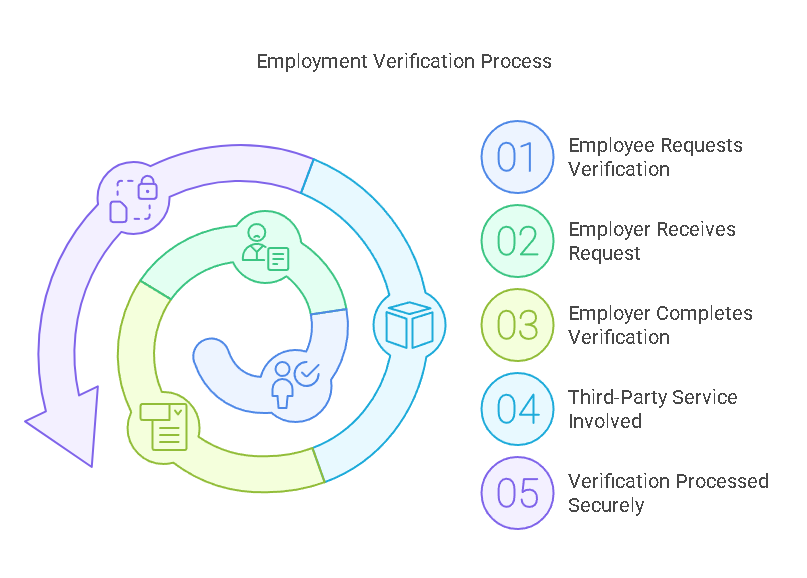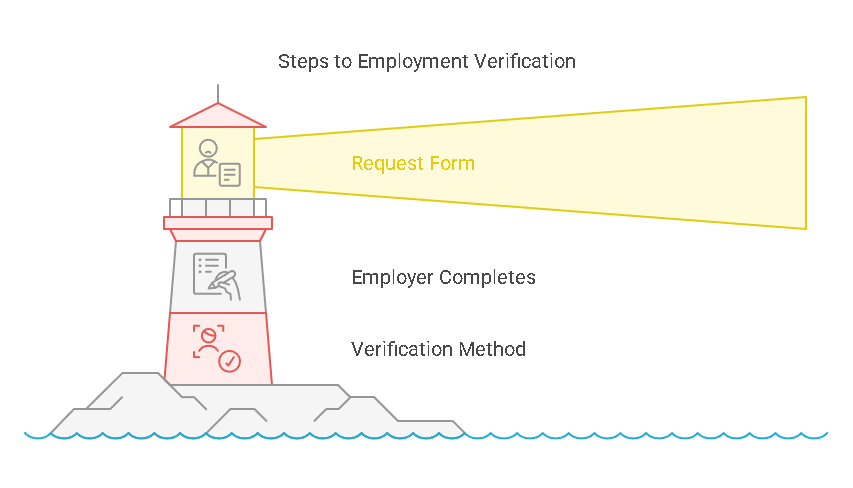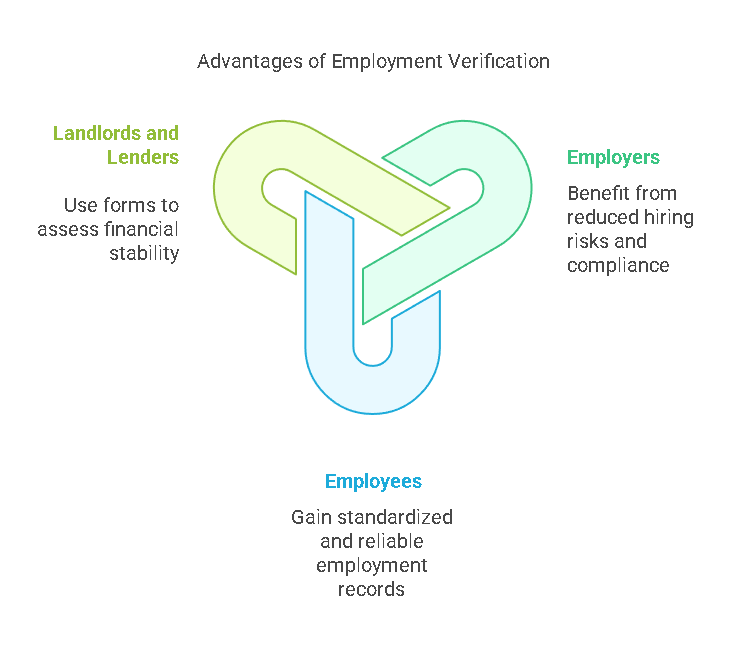Complete Guide to the Verification of Employment Form in Texas

Introduction to the Verification of Employment Form in Texas
In Texas, a verification of employment (VOE) form is an essential document that confirms an individual’s employment status, income, and other employment-related details. This form serves as a crucial tool for verifying an employee’s current or past employment for various purposes such as securing loans, renting an apartment, or undergoing a background check. It provides employers, lenders, landlords, and other interested parties with accurate and official information about an individual’s work history, salary, and job title.
Verification of employment is not only a standard part of business processes but also helps ensure transparency, reduce the potential for fraud, and maintain the integrity of applications for loans, rentals, or job placements. The form typically includes information like the employee’s job title, the dates of employment, salary or wage information, and the employer’s contact details for verification purposes.
Purpose of the Verification of Employment Form

The primary purpose of a verification of employment form is to provide an official record confirming an employee’s employment status and income. This is essential in several common scenarios in Texas, including:
- Loan Applications: When individuals apply for personal loans, mortgages, or car loans, lenders often require a VOE to confirm the applicant’s income and employment stability. This helps the lender assess the applicant’s ability to repay the loan.
- Apartment Rentals: Landlords often require tenants to submit a verification of employment form to ensure that they have a reliable source of income and can afford monthly rent payments.
- Background Checks: Many employers require a VOE when conducting background checks to confirm the information provided by potential hires on their resumes or job applications.
- Immigration and Visa Applications: When applying for immigration status changes or visas, individuals may need to submit a VOE form to demonstrate their employment and financial stability.
- Insurance Claims: In some cases, insurance providers may request a VOE to process claims for disability or worker’s compensation.
By providing official confirmation of employment details, the verification form helps protect both employers and employees in financial or contractual matters.
Common Situations Where Employment Verification Forms Are Required
There are various situations in which individuals or organizations may require an employment verification form in Texas. These situations typically involve verifying the financial stability or credibility of an individual, such as:
- Job Applications and Background Checks: Employers often request VOE forms during hiring processes to confirm a candidate’s work history, job title, and salary. This step ensures that the applicant’s claims about their work experience are accurate.
- Tenant Background Checks: Landlords may request a VOE from potential tenants as part of the rental application process. This helps landlords assess whether the tenant is financially stable enough to meet rent obligations.
- Loan or Mortgage Applications: Lenders request employment verification forms as part of the loan approval process to determine whether applicants are financially capable of repaying loans or mortgages.
- Worker’s Compensation and Disability Insurance: In the case of insurance claims related to work injuries or disability benefits, claimants may be asked to submit a VOE form to verify their employment and earnings.
- Immigration and Visa Processes: Individuals applying for visas or immigration-related documentation often need to provide proof of employment in order to demonstrate financial self-sufficiency.
In each of these scenarios, the verification form is used to ensure the accuracy of the applicant’s claims, reduce the risk of fraud, and protect the interests of all parties involved.
Required Information on the Verification of Employment Form
An employment verification form typically includes a range of information that helps confirm an individual’s employment status. The following are common details requested on the form:
- Employee’s Name and Job Title: The full name of the employee and their current job title or position within the organization.
- Dates of Employment: The start and, if applicable, end date of the employee’s employment. This confirms how long the employee has worked with the company.
- Salary or Wage Information: The employee’s salary or hourly wage, which is necessary for verifying income. In some cases, additional information about bonuses or commissions may also be included.
- Job Responsibilities: A brief description of the employee’s primary duties and responsibilities within the organization. This helps provide a more complete picture of their role and qualifications.
- Employer’s Contact Information: This section includes the contact details for the HR department or other relevant individuals who can verify the accuracy of the employment information provided.
- Employee Benefits: Some verification forms may include details about the employee’s benefits package, such as health insurance, retirement plans, and vacation time.
- Reason for Verification: Depending on the form’s purpose, the employer may be asked to indicate the reason for the verification, such as a mortgage application or job transfer.
The accuracy and timeliness of the information on the VOE form are critical, as any discrepancies or delays in processing can affect the applicant’s financial or housing applications.
Who Issues the Verification of Employment Form?

Typically, employers are responsible for providing verification of employment forms. This may be done directly by the employer or through a third-party service provider. In some cases, employees may request the form from their employer, but it is the employer’s responsibility to complete and verify the details provided. Employers are obligated to ensure that the information they provide is accurate, truthful, and in compliance with any legal requirements in Texas.
In some situations, third-party verification services are used by employers to handle the process. These services work on behalf of companies to confirm employment details, thereby reducing administrative burden and ensuring the information is securely processed. Third-party providers may also offer digital verification services, making the process faster and more secure.
Importance of Accuracy in Employment Verification Forms
Accuracy is paramount when it comes to employment verification forms. Errors or omissions on the form can lead to delays in loan approval, rental agreements, or job applications. Moreover, any discrepancies in the provided information could raise red flags for lenders, landlords, or employers, potentially resulting in rejection or further investigation.
For employers, providing inaccurate or false information on an employment verification form could also lead to legal consequences, including claims of misrepresentation. Ensuring that all details are current and accurate is essential to maintaining trust and compliance with legal regulations.
Differences Between Verification of Employment Forms and Other Forms
While the verification of employment form serves as an official statement of employment and income, it differs from other forms used for similar purposes:
- Income Verification Forms: These forms are typically used to verify income specifically, which may not always include employment details like job title or dates of employment. Income verification forms are commonly used for tax filings, loan applications, and mortgage approvals.
- Background Check Forms: These forms collect information related to an individual’s criminal history, credit history, and employment history. While they may contain some overlapping information with VOE forms, background check forms focus more on screening an applicant for risk.
- Pay Stubs: While pay stubs also show income, they do not provide confirmation of employment dates, job title, or other employment-specific information. Pay stubs are typically used in conjunction with or in place of VOE forms for income verification purposes.
Texas-Specific Considerations for Employment Verification
In Texas, there are several specific considerations that both employers and employees should be aware of regarding employment verification:
- Employee Rights: Under Texas law, employees have the right to request verification of their employment details and to ensure that the information provided is accurate.
- Employer Responsibilities: Employers must comply with state and federal regulations when handling employment verification forms. For example, they must ensure the information is accurate, complete, and provided in a timely manner. They must also ensure that they respect the privacy rights of employees by safeguarding sensitive information.
- Legal Compliance: Texas employers must adhere to various federal and state laws, including the Fair Credit Reporting Act (FCRA) and Texas labor laws, when completing and submitting verification of employment forms.
Step-by-Step Process for Verification of Employment

The process of employment verification in Texas involves several steps that need to be followed by both the employee and the employer. Here’s a detailed breakdown of the steps involved in obtaining and completing a verification of employment form:
- How to Request a Verification of Employment Form
Employees in Texas can request a verification of employment form from their employer when needed. Often, employees may be asked to provide a written request to initiate the process. The request can be made in person, through email, or via company portals if available. The employee may need to specify the reason for the verification, such as a mortgage application or rental agreement, to ensure that the employer knows how to tailor the form accordingly. - Employer’s Responsibilities in Completing the Form
Once the request has been made, the employer’s responsibility is to ensure the form is filled out accurately. Employers should check the employee’s records to confirm details such as employment dates, salary, and job title. They must verify the information before signing and providing the form to the requesting party, whether it is a landlord, lender, or another employer. Employers should also ensure compliance with privacy laws when handling sensitive employee data. - Methods of Verification in Texas
In Texas, there are various methods for completing employment verifications:- Direct Form Submission: The employee requests a form, and the employer completes it and sends it directly to the requesting party.
- Digital Verification: Employers can use digital platforms or HR software to confirm employment status. Services like The Work Number or other third-party verification providers facilitate a quicker, more secure method of employment verification.
- Third-Party Services: Many businesses rely on third-party verification services that specialize in handling employment verifications. These companies work directly with employers to verify employee information and provide the verification form to interested parties. This method often improves the speed and reliability of the process.
Verification of Employment for Different Purposes
The verification of employment form serves different purposes depending on the context. Below, we explore the various scenarios in which the form is typically used:
- Apartment Rental Applications
Landlords often require a verification of employment form during the tenant screening process to confirm that potential tenants have a steady income. A verified source of income is essential for landlords to assess whether a tenant will be able to afford rent. The form helps confirm the applicant’s income and job stability, which is crucial for rental decisions. - Loan or Mortgage Applications
When applying for loans or mortgages, lenders require verification of employment to ensure the applicant’s financial reliability. They need proof of income and employment to assess whether the individual is capable of repaying the loan. The form provides lenders with vital information about the applicant’s current salary and employment status, making it an essential part of the loan application process. - Background Checks for Employment
Employers often request a verification of employment form when conducting background checks on job applicants. This helps ensure that the applicant has the necessary work experience and employment history they claim. The VOE form serves as an official confirmation of the individual’s job title, salary, and employment period, which can be cross-checked during the background verification process. - Immigration and Visa Applications
In certain cases, employment verification forms are required as part of visa or immigration application processes. These forms help prove that the applicant has stable employment in the U.S. and can financially support themselves during their stay. Employers may be asked to confirm the details of the employee’s job and salary as part of the immigration process.
What to Do If Verification Is Delayed or Denied
In some cases, employees or employers may face delays or denials in the employment verification process. If verification is delayed or denied, here are the steps to take:
- Employee Action: If an employee is facing a delay or denial, they should follow up with their employer to understand the reason behind the delay. It is helpful to provide any additional documentation or clarification that the employer may need to complete the form. If necessary, the employee may request the form from a different contact within the organization, such as the HR department.
- Employer Action: Employers should ensure they are not violating any privacy laws or company policies when processing employment verifications. If there are legal reasons for the delay, such as privacy concerns, these should be communicated to the requesting party. Employers may also want to consider using third-party verification services to streamline the process and prevent delays.
Benefits of Verification of Employment in Texas

The use of employment verification forms brings various benefits to employees, employers, and other parties involved in the process. These benefits include:
- For Employers
Employers benefit from employment verification forms as they help reduce the risk of hiring individuals with falsified resumes or job histories. By verifying the information provided by applicants, employers can ensure they are hiring qualified and trustworthy individuals. Verification also ensures compliance with industry standards, as employers can confirm income and employment status for loan approvals or tenant screenings. - For Employees
Employees benefit from the standardization that a VOE form offers. It provides a reliable and easily verifiable record of employment, making it easier for employees to prove their income and employment status to lenders, landlords, and others. By offering an official document of employment, the form helps employees navigate processes like securing loans, renting apartments, or applying for new jobs. - For Landlords and Lenders
Landlords and lenders use employment verification forms to assess an applicant’s financial stability. In the case of rental applications, landlords want to ensure tenants can afford rent, and in the case of loans, lenders want to verify an applicant’s ability to repay. The form provides them with the necessary information to make informed decisions.
Precisehire and Employment Verification
Precisehire is a platform designed to assist businesses in Texas with employment verification, employee screening, and background checks. With its advanced tools and expertise, Precisehire streamlines the employment verification process for both employers and employees.
Precisehire provides secure, reliable, and accurate background checks and employment verification services tailored to meet the unique requirements of Texas employers. By partnering with Precisehire, businesses can simplify the verification process, reduce administrative workload, and ensure compliance with Texas labor laws. Precisehire also offers features that ensure the confidentiality and security of sensitive employee information, giving both employers and employees peace of mind.
For employers, Precisehire offers an easy way to conduct thorough background checks, verify employment details, and ensure they are hiring qualified candidates. For employees, the platform provides quick and accurate verification services, making it easier to meet the requirements for loans, apartments, or other verification needs.
| Purpose of Employment Verification | Typical Information Required | Who Provides the Form |
|---|---|---|
| Apartment Rental Applications | Employee’s job title, salary, dates of employment | Employer |
| Loan or Mortgage Applications | Employee’s income, job title, employment dates | Employer |
| Background Checks for Employment | Dates of employment, job title, salary, duties | Employer |
| Immigration or Visa Applications | Employee’s income, job status, dates of employment | Employer |
| Tenant Screening for Rental Properties | Job stability, salary, employment dates | Employer |
Legal Aspects of Employment Verification in Texas
Employment verification in Texas is governed by various state and federal laws that protect both employees and employers during the verification process. These legal frameworks ensure that the verification process is carried out in a manner that respects privacy, prevents discrimination, and ensures compliance with regulatory standards.
Texas Labor Laws
Texas employers are required to adhere to certain labor laws when completing employment verification forms. While there is no state-specific law that mandates employment verification forms, Texas employers must comply with federal and state employment laws that address privacy, discrimination, and record-keeping.
The Texas Workforce Commission (TWC) is responsible for overseeing labor standards in the state. Employers are required to maintain accurate employment records and provide verification when requested. However, Texas does not have a law that specifically mandates employers to provide verification forms for employment unless it is required for specific transactions such as loans or housing applications.
Federal Laws
The employment verification process is subject to various federal laws that govern the protection of personal information and fairness in employment practices. The Fair Credit Reporting Act (FCRA) plays a significant role in employment verification. It establishes guidelines for employers to ensure that the information provided during the verification process is accurate, that it’s used for lawful purposes, and that employees’ privacy is safeguarded.
Additionally, the Fair Labor Standards Act (FLSA) governs the payment of wages and overtime for employees, and employers are required to keep accurate records of wages and hours worked. Any discrepancies in the verification of employment forms can lead to legal consequences for both employers and employees.
Employer Obligations
Employers have specific obligations when completing employment verification forms. These responsibilities include:
- Providing Accurate Information: Employers must ensure that all information provided on employment verification forms is truthful and up-to-date. Providing false or misleading information can lead to legal consequences for employers, including fines or legal action from employees.
- Timeliness: Employers are expected to complete verification forms in a timely manner. Delays in providing requested information could hinder employees’ ability to secure housing, loans, or other opportunities.
- Confidentiality: Employers must maintain the confidentiality of the information provided in employment verification forms. Under federal and state law, employers are prohibited from disclosing private employee information without consent.
Employee Rights
Employees have several rights regarding the verification process, including:
- Right to Request Verification: Employees have the right to request verification of employment from their employer at any time. This is particularly important for employees who need to prove their employment status for various reasons such as housing, loans, or background checks.
- Right to Correct Information: Employees have the right to dispute any inaccuracies on their employment verification form. If the information is found to be incorrect, employees can request that their employer correct it and provide an updated form.
- Right to Privacy: Employees are entitled to have their personal information handled with care. Employers must ensure that the data on employment verification forms is not misused or shared without the employee’s consent, except when required by law.
Penalties for Non-Compliance
Employers who fail to comply with employment verification regulations in Texas may face various penalties. If an employer provides false information or fails to provide the verification form when requested, they could be subject to legal action, including:
- Fines: Employers may face fines for failing to provide accurate or timely employment verification.
- Lawsuits: Employees can pursue legal action if an employer does not comply with their request for verification, particularly if the failure to verify leads to financial or personal harm.
- Reputation Damage: Employers who fail to comply with employment verification regulations can suffer damage to their reputation, especially if their actions are publicly known.
Privacy Concerns
Employers in Texas must be cautious when handling personal employee information during the verification process. The Texas Privacy Protection Act and federal laws such as the Gramm-Leach-Bliley Act and the Health Insurance Portability and Accountability Act (HIPAA) impose strict requirements on the protection of personal data, including employment records.
Employers must ensure that employment verification forms are stored securely and that only authorized personnel have access to sensitive information. Breaches of confidentiality can lead to legal penalties and harm to the employee.
FAQs
What Information is Required on a Verification of Employment Form in Texas?
A verification of employment form in Texas typically requires details such as the employee’s name, job title, employment dates, salary, and job responsibilities. It may also include contact information for the employer, allowing for third-party verification.
How Long Does the Verification Process Take in Texas?
The verification process typically takes anywhere from a few days to a couple of weeks, depending on how quickly the employer can complete the form and the method of submission (e.g., digital or manual). Delays may occur if the employer requires additional information or if there is difficulty in reaching the relevant parties.
Can an Employer Refuse to Complete an Employment Verification Form?
While employers generally have the discretion to complete or refuse verification requests, they cannot refuse to provide accurate information when legally required (such as during loan applications, background checks, or rental agreements). However, refusal without a valid reason could result in legal consequences.
How Do I Verify My Employment if My Employer Doesn’t Respond?
If your employer does not respond to a verification request, you may contact the HR department or relevant supervisor to follow up. If necessary, you can explore third-party verification services or contact regulatory agencies for assistance in securing verification.
Is Employment Verification Required by Texas Law for All Employees?
Texas law does not mandate employment verification forms for all employees. However, they are commonly required for specific purposes such as loans, rental agreements, and background checks. Employers are not required by law to provide verification forms unless specified by an external party or legal requirement.
Conclusion
In conclusion, verification of employment forms play a crucial role in ensuring that employees, employers, landlords, and lenders have access to accurate and timely information. These forms are vital in various processes such as loan applications, background checks, and tenant screenings. Ensuring compliance with Texas state laws, federal regulations, and privacy concerns is essential to maintaining a smooth and secure verification process.
Precisehire offers efficient and reliable employee verification services, helping businesses ensure compliance with Texas regulations while streamlining their verification process. By partnering with Precisehire, employers can access secure, accurate, and timely employment verification, benefiting both employers and employees. With Precisehire’s assistance, employers can ensure they meet legal obligations and provide employees with the necessary documentation to proceed with their applications confidently.
